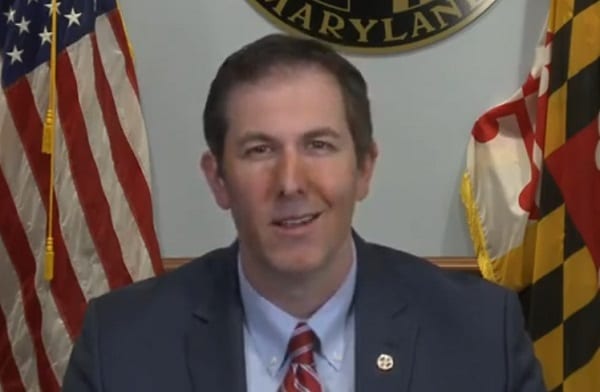NOTTINGHAM, MD—Baltimore County Executive Johnny Olszewski will again make the fight for school construction and transformational education funding the top priorities of his legislative agenda for the upcoming 2021 General Assembly session.
The continued push for education funding will be part of a robust agenda that also includes policies to protect the environment, replicate Baltimore County’s police reform model, and increase accountability in the Baltimore County Public School system.
“We need to secure the critical investments in our schools, our neighborhoods, and our communities,” Olszewski said. “Our agenda this year is focused on expanding upon the progress we’ve already made to provide every student with the education they deserve, make our government more accountable to the people we serve, create more sustainable communities for future generations, and strengthen our communities to build a better Baltimore County for all.”
The Olszewski Administration’s 2021 legislative agenda includes:
Investing in Educators and Students
Governor Hogan’s veto of The Blueprint for Maryland’s Future legislation has delayed an opportunity for Maryland to implement policies to transform the state’s education system, according to Olszewski.
In his first two years in office, Olszewski has provided back-to-back years of record funding for public education. Recognizing that Maryland’s students cannot wait any longer, he continues to support the override of the Governor’s veto.
Investing in our Schools and Classrooms
Governor Hogan’s veto of The Blueprint for Maryland’s Future triggered a provision that blocked the implementation of the bipartisan Built to Learn Act
Baltimore County has funded $242 million in shovel-ready school construction projects. These projects cannot move forward without the state’s overdue investment. Baltimore County supports the override of the Governor’s veto to help build modern schools and improve the lives of students.
Addressing Fraud, Waste and Abuse within BCPS
The Baltimore County Public School system does not currently have an adequate oversight mechanism to root out fraud, waste and abuse. Currently, the Baltimore County Office of the Inspector General’s oversight is limited to general government agencies and functions. Baltimore County supports legislation to expand the Baltimore County Office of the Inspector General’s oversight authority within the school system.
Centralizing and Prioritizing Maryland’s Efforts to Combat Climate Change
While various Maryland agencies are tasked with duties related to climate change and sustainability, there is no state cabinet position or office tasked with coordinating statewide efforts to address climate change. Baltimore County supports creating a cabinet position or office to centralize climate change and sustainability efforts across state government.
Modernizing Baltimore Area Waste Disposal
Numerous jurisdictions in the Baltimore Metropolitan region need modernized waste disposal practices and facilities. Baltimore County supports legislation to require MDE to analyze and propose solutions regarding the creation of a regional waste disposal facility.
Eliminating Chemical Threats to Public Health
Glyphosate, the widely-used active ingredient in common pesticides, has consistently been linked to a variety of serious health concerns, including cancer, liver damage, and fertility and reproductive issues. Baltimore County supports legislation to ban glyphosates statewide.
Creating Consistent Environmental Standards
State law currently requires LEED silver or equivalent standards for new buildings, but the standards do not apply to renovations, additions or other modifications. Baltimore County is supporting legislation requiring LEED certification in public school construction and renovation.
Enacting Police Reform
Earlier this year, Baltimore County became the first jurisdiction in the region to take action, passing the SMART Policing Act. Baltimore County supports legislation consistent with the SMART Policing Act to ban chokeholds, expand whistleblower protections, as well as efforts to amend MPIA statutes to increase transparency and strengthen oversight
Protecting Those Who Serve
Current statutes offer insufficient protection for public safety personnel and work crews. More than 3,500 were injured, and 46 people were killed in work zone crashes across Maryland from 2014-2018. Baltimore County supports protecting those who serve us from dangerous drivers on our roadways.
Do you value local journalism? Support NottinghamMD.com today.

